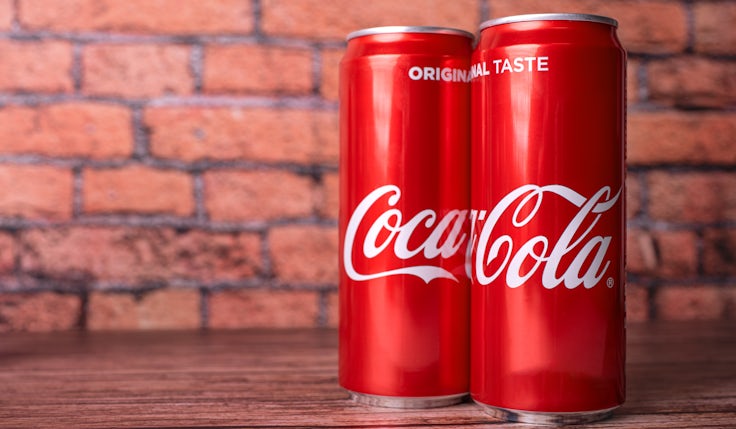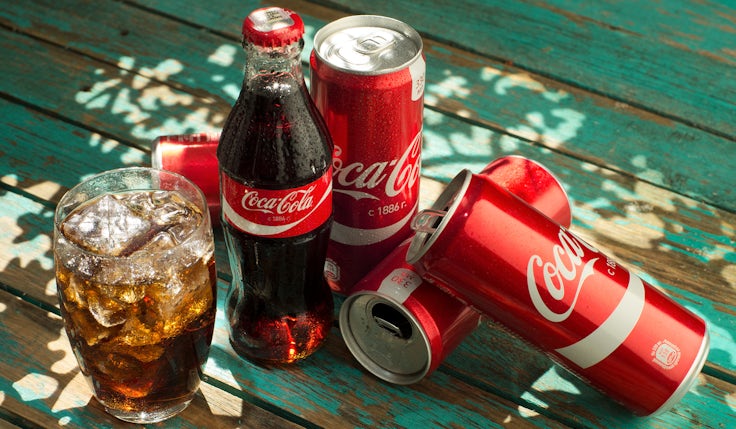Why Diet Coke’s ‘ultimate goal’ is connecting with loyal customers
Diet Coke is keen to emphasise its connection to fashion as it turns 40, with its Kate Moss partnerships designed to engage “loyal fans” and build equity in the brand.
 As Diet Coke celebrates its 40th anniversary, the brand believes its future growth will come from creating “meaningful” relationships with loyal customers.
As Diet Coke celebrates its 40th anniversary, the brand believes its future growth will come from creating “meaningful” relationships with loyal customers.
Indeed, Coca-Cola GB marketing director Louise Maugest tells Marketing Week these relationships are the “ultimate goal for the brand”.
“There’s so much we can do to keep engaging with our loyal fans and consumers and take the brand forward in that way,” she says. “We can really create a kind of meaningful connection between the brand and our consumers.”
As part of this drive, and in celebration of the 40-year milestone, Diet Coke has teamed up with fashion icon Kate Moss, its newly-appointed creative director, to release a capsule collection of Diet Coke cans inspired by the supermodel’s looks.
This collection, which also offers the chance for consumers to win prizes picked out by Moss, is aimed at what Maugest calls the “loyal fans” and people who “really love the brand”.
We now think about the plan in a more end to end way, so that means thinking about the whole experience that you get as a consumer.
Louise Maugest, Coca-Cola
The Coca-Cola business has previously said that building an engaged relationship with consumers is a priority. For example, in April when the company opened a flagship store in central London, Coca-Cola told Marketing Week that one of the primary aims of the store was to help it grow “brand love”.
Diet Coke is “lucky” because it has “an extremely loyal audience”, adds Maugest, who explains the business is increasingly using data from this loyal consumer base to better understand their needs and preferences.
She says this focus on data is helping the organisation understand when its campaigns are doing well and giving it the ability to leverage what’s working for the business.
As an example, she points to the ‘Love What You Love’ campaign, which Diet Coke launched earlier this year. It celebrates self expression and being unashamed of what you love, which Maugest says has been doing “really well” in the UK.
“So we’re looking at how we build on that campaign again, rather than start from scratch and create something completely new in six months’ time,” she explains.
Building on successful campaigns in this way and thinking long term rather than “reinventing the wheel” is improving the effectiveness of the organisation’s marketing, she says, adding that marketing effectiveness is something Coca-Cola is “very focused on”.
Speaking at the Cannes Lions Festival of Creativity in June, Coca-Cola’s CMO Manolo Arroyo described effectiveness as having “a special place in [his] heart”.
“Effectiveness is really about engaging radically differently in this new world,” he said.
Coke CMO: Effectiveness is about engaging consumers in ‘radically different’ ways
Learning faster
In 2021, Coca-Cola unveiled a new marketing model designed to bring long-term growth. It saw the business revamp its agency model, aimed at preventing siloing and allowing the business to launch more integrated campaigns.
Nine months on, Maugest says the new model is paying off. Coca-Cola appointed WPP as its lead agency in November 2021. The brand is working “a lot more closely” with WPP and the agency/brand relationship has “felt like a partnership”, she says.
The new model has also sped up the “test and learn” process in the business, Maugest notes. “We’re testing things in different countries and sharing what worked and what didn’t work, and then reapplying lessons.”
The brand has such a strong heritage, it would be a shame not to leverage it.
Louise Maugest, Coca-Cola
As an example, Maugest says Diet Coke’s approach to media has change, admitting the brand used to be “obsessed with TV”.
“We now think about the plan in a more end to end way, so that means thinking about the whole experience that you get as a consumer,” she explains. So rather than just focusing on TV for the Kate Moss tie-up, it will be promoted across out of home, on-pack and through experiences, as Diet Coke looks to “bring the campaign to life where our consumers live”.
Diet Coke’s brand journey
Since 2015, Coca-Cola has implemented a ‘One Brand’ strategy, this was brought in to encourage a more unified view of the company’s Coca-Cola, Diet Coke and Coca-Cola Zero Sugar brands.
In 2021, a revamp of the packaging was launched to bring the three brands in line with each other. At the time the business said the strategy was “integral to [its] approach to marketing across the Coca-Cola trademark”.
Maugest says that, since the One Brand strategy began, Diet Coke has been on something of a “journey”.
“If you think about a few years ago, Diet Coke was very separate from the rest of the of the Coke trademark and it’s now a lot more in line,” she says.
But the strategy doesn’t mean there isn’t a “bespoke plan” for Diet Coke to give it “time to shine”.
“The brand has such a strong heritage, it would be a shame not to leverage it,” she adds.
If you think about a few years ago, Diet Coke was very separate from the rest of the of the Coke trademark and it’s now a lot more in line.
Louise Maugest, Coca-Cola
That heritage particularly comes into play with Diet Coke’s longstanding association with the world of fashion, which is why the tie-up with Kate Moss made sense. “It’s bringing together two fashion icons,” Maugest says.
Diet Coke is also set to partner with London Fashion Week next month, as it looks to strengthen its association with the world of fashion.
It’s not the first time Diet Coke has collaborated with the world of fashion. In 2013 it teamed up with designers including Matthew Williamson, Gianfranco Ferre, Marni and Roberto Cavalli to create bespoke bottle designs.
The “passion point” of fashion is something that is very relevant for Diet Coke’s loyal customer bases, she claims. But the work with Moss isn’t just designed for avid fashionistas, it’s for anyone with a casual interest in the topic, she says.
Maugest also points to the Love What You Love campaign, which links Diet Coke to the idea of confidence in who you are and what you do, something that is universally relevant.






